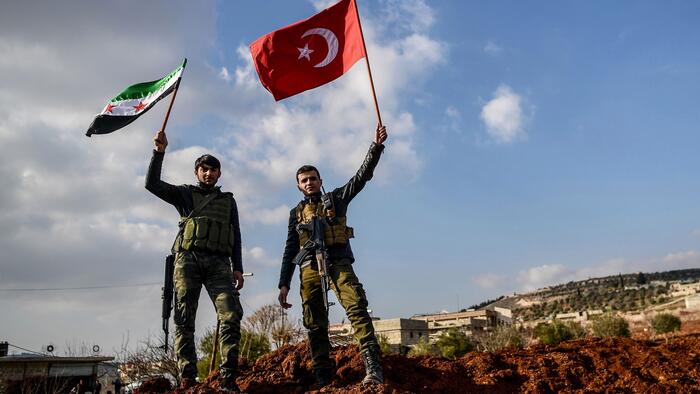In a surprising statement following Friday prayers in Ankara, Turkish President Tayyip Erdogan appeared to confirm that his intelligence services are involved in supporting the jihadist group Hayat Tahrir al-Sham (HTS) in their recent military actions, including the capture of Aleppo and their advance toward Damascus. Erdogan expressed hope for the continued success of this offensive, significantly implying his approval of a regime change effort reminiscent of the violence experienced during the Syrian Civil War that began over a decade ago in 2011. This development is noteworthy as it underscores Turkey’s more overt involvement in the Syrian conflict, with Erdogan’s statement drawing immediate attention due to its implications regarding international relations and Turkey’s role as a NATO member.
In a calculated effort to navigate the complex geopolitical landscape, Erdogan promptly distanced himself from acknowledging HTS, which is considered a terrorist organization by the United States. He noted ongoing tensions in the region, framing Turkey’s actions within the broader context of resistance against terrorist groups while extending overtures to Syrian President Bashar al-Assad. Erdogan’s remarks indicated a willingness to explore dialogue regarding Syria’s future, though Assad has historically rebuffed similar attempts. This complexity of relations emphasizes the troubled dynamics within the region, particularly as various states begin to re-engage with Assad despite prior conflicts.
Turkey’s long-standing military presence in northern Syria has facilitated the movement of foreign fighters, often referred to as a ‘jihadi highway’, which has exacerbated the situation in Syria and particularly affected groups like the Kurds. The involvement of these fighters and Turkey’s strategic interests have drawn criticism from multiple international observers, including officials from the United States, who acknowledge the role that external support has played in fuelling the ongoing violence in the region. This context raises questions about Turkey’s motivations and the implications of Erdogan’s latest comments on broader security and stability in Syria.
As Turkey’s support for HTS draws closer scrutiny, the ramifications for the Astana peace process, which included discussions mediated by Russia, Turkey, and Iran, seem increasingly precarious. The delicate balance of power that had allowed for some level of coordination among these nations appears to be eroding, further complicating the conflict landscape. The air operations by Russian and Syrian forces against Turkish-backed groups reflect the volatility in the region, revealing ongoing clashes and challenges in reigning in militant groups that threaten established ceasefires and negotiating frameworks.
Amidst these developments, the conflict’s humanitarian aspects remain dire, with continuous violence impacting civilian populations across Syria. Many regions, particularly those inaccessible due to active fighting, suffer from severe humanitarian crises, compounded by external military interventions and logistical blockages that hinder aid delivery. The escalation of hostilities prompted by Turkey’s endorsement of HTS’s advance raises critical concerns about the protection of civilians and the long-term consequences of such military engagements.
In summary, Erdogan’s endorsement of a jihadist-led advance toward Damascus not only signals a pivotal moment for Turkey’s foreign policy but also illuminates the intricate web of alliances and enmities in Syria. The destabilization caused by Turkey’s military ambitions, alongside its historical ties to various militant factions, threatens to undermine any progress towards peace. As the situation continues to unfold, the international community watches closely, aware that the balance of power in Syria remains precariously poised between competing national interests and the humanitarian needs of the Syrian people.

